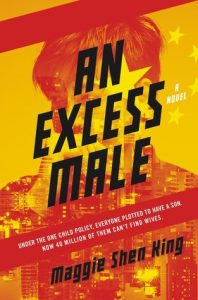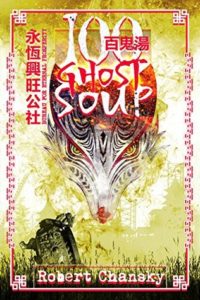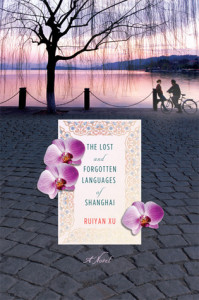 I borrowed a copy of Maggie Shen King‘s An Excess Male from my local library.
I borrowed a copy of Maggie Shen King‘s An Excess Male from my local library.
Description from Goodreads:
Under the One Child Policy, everyone plotted to have a son. Now 40 million of them can’t find wives. China’s One Child Policy and its cultural preference for male heirs have created a society overrun by 40 million unmarriageable men. By the year 2030, more than twenty-five percent of men in their late thirties will not have a family of their own.
An Excess Male is one such leftover man’s quest for love and family under a State that seeks to glorify its past mistakes and impose order through authoritarian measures, reinvigorated Communist ideals, and social engineering. Wei-guo holds fast to the belief that as long as he continues to improve himself, his small business, and in turn, his country, his chance at love will come. He finally saves up the dowry required to enter matchmaking talks at the lowest rung as a third husband—the maximum allowed by law. Only a single family—one harboring an illegal spouse—shows interest, yet with May-ling and her two husbands, Wei-guo feels seen, heard, and connected to like never before. But everyone and everything—walls, streetlights, garbage cans—are listening, and men, excess or not, are dispensable to the State. Wei-guo must reach a new understanding of patriotism and test the limits of his love and his resolve in order to save himself and this family he has come to hold dear.
Spoilery Review:
I wavered between a four and five star on this book. It isn’t easy to read at times and my first words on finishing the book were a wail of, “XXX doesn’t get his happy ending.” It’s almost worse than that honestly, because a gay man in a family is replaced by a straight man and the family is functionally improved. It is definitely only the straight characters who get their simple happy ending, and that very much bothered me. But the more I thought about it, the more I decided that I think there are more layers to it than just that.
Yes, if I took the very Scarlet O’hara-like everything will be better tomorrow passage at the end to just be a glib wrap up, then this book would fall in my estimation. Instead, however, I choose to read it to suggest that XXX is actually working with a person he could have a discreet, mutually meaningful relationship with, to bring about real social change in society that will enable him to openly rejoin his family. And this I see as a happy, if delayed ending. It’s certainly the happiest ending the book could allow in the society as presented. I think it’s important to remember that, despite involving love and family, this is not a romance novel. Tragic? Yes. But also hopeful.
A book isn’t just it’s ending, of course, and I found this one to also have a believable example of an autistic adult, poly relationships, positively represented gay men (there are mysteriously no lesbians or bisexuals, though you’d think the the latter would be ideal in such a society), beautiful writing and complex emotions. Also, I thought all the different types of love shown were wonderful. Though love was also demonstrated to be brittle and painful when not similarly reciprocated, no matter how hard the characters tried. And they REALLY tried.
All in all, An Excess Male made me think and feel and I truly enjoyed it.

 I received a copy of
I received a copy of 